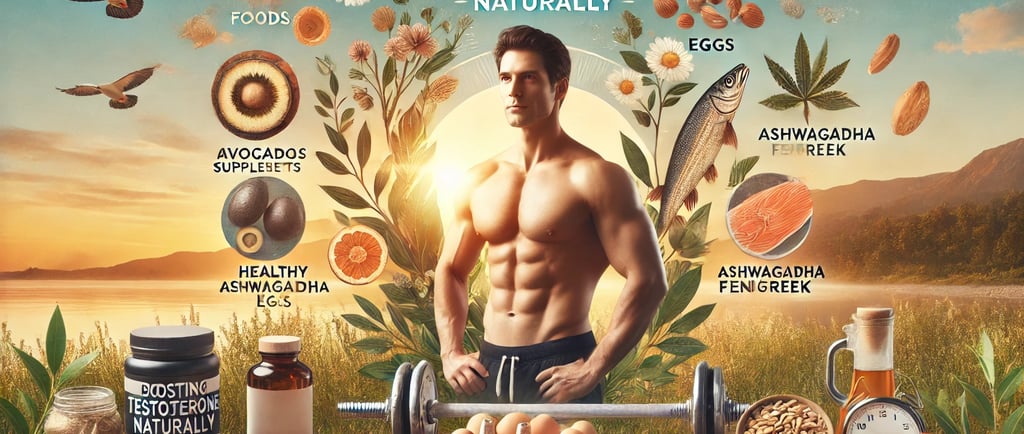How to Boost Testosterone Naturally: A Complete Science-Backed Guide
Are you struggling with low testosterone levels? Do you feel less energetic, face difficulties in building muscle, or notice changes in mood and libido? You’re not alone. Many men experience a decline in testosterone as they age, but the good news is that you can naturally boost your testosterone levels with scientifically proven methods. In this article, we’ll explore actionable steps to improve your hormonal health using strategies backed by research.
HEALTH
12/18/20244 min read


What is Testosterone and Why is It Important?
Testosterone is the primary male sex hormone that regulates:
Muscle mass and strength
Fat distribution
Mood and energy levels
Libido and reproductive health
Testosterone levels naturally decline by about 1% per year after the age of 30. Lifestyle factors like stress, poor diet, lack of exercise, and insufficient sleep can accelerate this decline. Fortunately, natural interventions can help you maintain optimal testosterone levels.
How to Boost Testosterone Naturally
1. Optimize Your Diet
What you eat directly impacts your testosterone levels. A well-balanced diet provides the nutrients necessary for hormone production.
Focus on Healthy Fats
Healthy fats are essential for testosterone production because cholesterol serves as a precursor to this hormone.
Sources: Avocados, olive oil, nuts, seeds, fatty fish, and whole eggs.
Scientific Evidence: A study in The Journal of Steroid Biochemistry and Molecular Biology found that men consuming diets rich in monounsaturated and polyunsaturated fats had higher testosterone levels than those on low-fat diets.
Prioritize Protein
Protein helps maintain muscle mass and regulates fat levels, both of which influence testosterone.
Sources: Lean meats, poultry, fish, eggs, and legumes.
Scientific Evidence: Studies have shown that excessive body fat reduces testosterone due to the conversion of testosterone to estrogen in fat tissue.
Add Key Micronutrients
Micronutrient deficiencies can drastically lower testosterone. Focus on:
Vitamin D: Known as the "sunshine vitamin," it acts like a hormone in your body.
Sources: Sun exposure, fortified foods, and supplements.
Evidence: A study published in Hormone and Metabolic Research showed a significant testosterone boost in men taking vitamin D3 supplements.
Zinc: Essential for testosterone production.
Sources: Oysters, beef, pumpkin seeds.
Evidence: Zinc supplementation increased testosterone levels in a 1996 study published in Nutrition.
Magnesium: Supports free testosterone levels.
Sources: Spinach, almonds, dark chocolate.
Evidence: A study in Biological Trace Element Research showed increased testosterone with magnesium supplementation, especially in active men.
2. Sleep Well for Hormonal Health
Testosterone production peaks during deep sleep, particularly during REM cycles.
Recommended Sleep: 7-9 hours per night.
Scientific Evidence: A study in The Journal of the American Medical Association (JAMA) found that men who slept less than 5 hours per night experienced a 10-15% drop in testosterone levels within one week.
Tips for Better Sleep:
Maintain a consistent sleep schedule.
Create a dark, cool, and quiet sleeping environment.
Limit screen time before bed to reduce blue light exposure.
3. Manage Stress Levels
Stress is a testosterone killer. When you’re stressed, your body produces cortisol, a hormone that directly inhibits testosterone production.
Stress Reduction Techniques:
Practice mindfulness or meditation.
Engage in physical activities like yoga or walking.
Use effective time management to reduce overcommitment.
Scientific Evidence: A study published in Stress: The International Journal on the Biology of Stress demonstrated that chronic stress decreases testosterone levels by increasing cortisol.
4. Maintain a Healthy Weight
Excess body fat, especially around the abdomen, contributes to lower testosterone levels by increasing the conversion of testosterone to estrogen.
Action Plan:
Follow a calorie-controlled diet to reduce body fat.
Combine resistance training with moderate cardio for effective fat loss.
Scientific Evidence: Research published in Obesity Reviews confirmed that weight loss significantly increases testosterone levels in overweight men.
5. Limit Alcohol and Quit Smoking
Both alcohol and smoking negatively affect testosterone production.
Alcohol: Reduces testosterone synthesis and increases estrogen levels.
Smoking: Impairs testicular function and reduces testosterone levels.
Scientific Evidence: A study in Alcohol and Alcoholism found that heavy drinkers had lower testosterone levels compared to non-drinkers.
6. Consider Science-Backed Natural Supplements
While no supplement can replace a healthy lifestyle, some natural compounds have been scientifically shown to support testosterone levels.
Ashwagandha
An adaptogen that reduces stress and improves testosterone production.
Evidence: A 2019 study in The American Journal of Men’s Health found a 17% increase in testosterone in men supplementing with ashwagandha.
Dosage: 300–600 mg daily.
Fenugreek
Fenugreek contains compounds that prevent the conversion of testosterone to estrogen.
Evidence: A study in Phytotherapy Research showed improved testosterone levels and physical strength in men taking fenugreek.
Dosage: 500–600 mg per day.
Vitamin D3
If you’re deficient, supplementing with vitamin D3 can significantly improve testosterone levels.
Dosage: 2,000–4,000 IU per day under a healthcare provider’s guidance.
Zinc and Magnesium
Zinc: 30-50 mg daily.
Magnesium: 200-400 mg daily.
7. Avoid Endocrine Disruptors
Environmental toxins like BPA and phthalates mimic estrogen and suppress testosterone production.
Actionable Tips:
Use glass or stainless steel containers for food storage.
Avoid microwaving food in plastic.
Choose natural personal care products free from harmful chemicals.
FAQs
Can You Boost Testosterone Naturally?
Yes, you can improve testosterone naturally by optimizing your diet, managing stress, improving sleep, losing weight, and using proven supplements like ashwagandha and fenugreek.
What Are the Best Foods to Boost Testosterone?
Foods rich in healthy fats (avocados, nuts, olive oil), protein (lean meats, fish), and key micronutrients (oysters for zinc, spinach for magnesium) are the best for testosterone production.
How Quickly Can Testosterone Levels Improve?
With consistent lifestyle changes, you can see improvements in energy and mood within weeks. However, significant increases in testosterone may take 3–6 months.
Conclusion: Your Blueprint to Better Testosterone
Boosting testosterone naturally is a long-term commitment to healthier living. Focus on nutrient-rich foods, stress reduction, quality sleep, weight management, and evidence-based supplements. These scientifically proven strategies not only improve testosterone but also enhance your overall health and vitality.
For personalized guidance on testosterone optimization and sustainable health strategies, connect with an experienced fitness coach. Visit my website sravanbfit.com to explore how I can help you achieve your fitness and hormonal health goals.
Achieve fitness goals with personalized coaching today.
Contact US
Quick Links
sravankumarbalivada@gmail.com
+91 8121412668
© 2024. All rights reserved.
SRAVAN BALIVADA FITNESS
